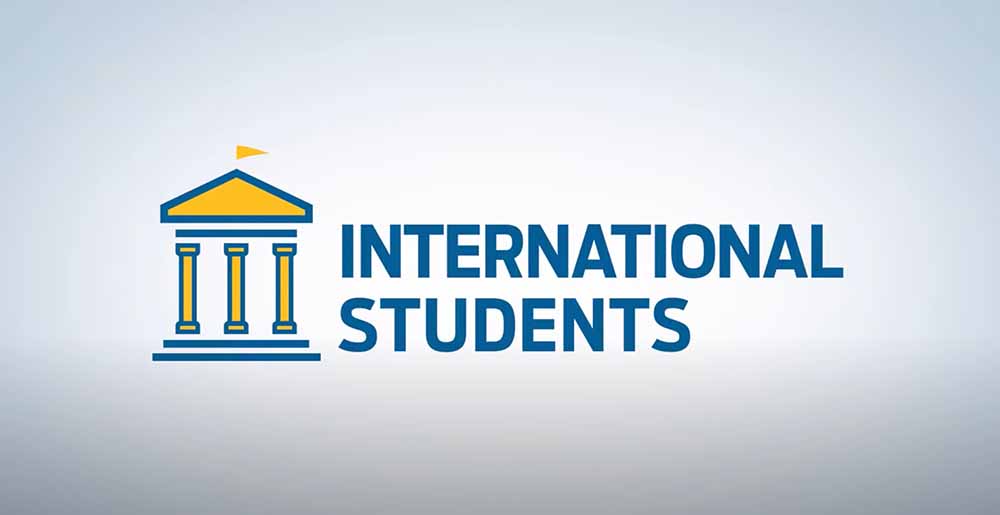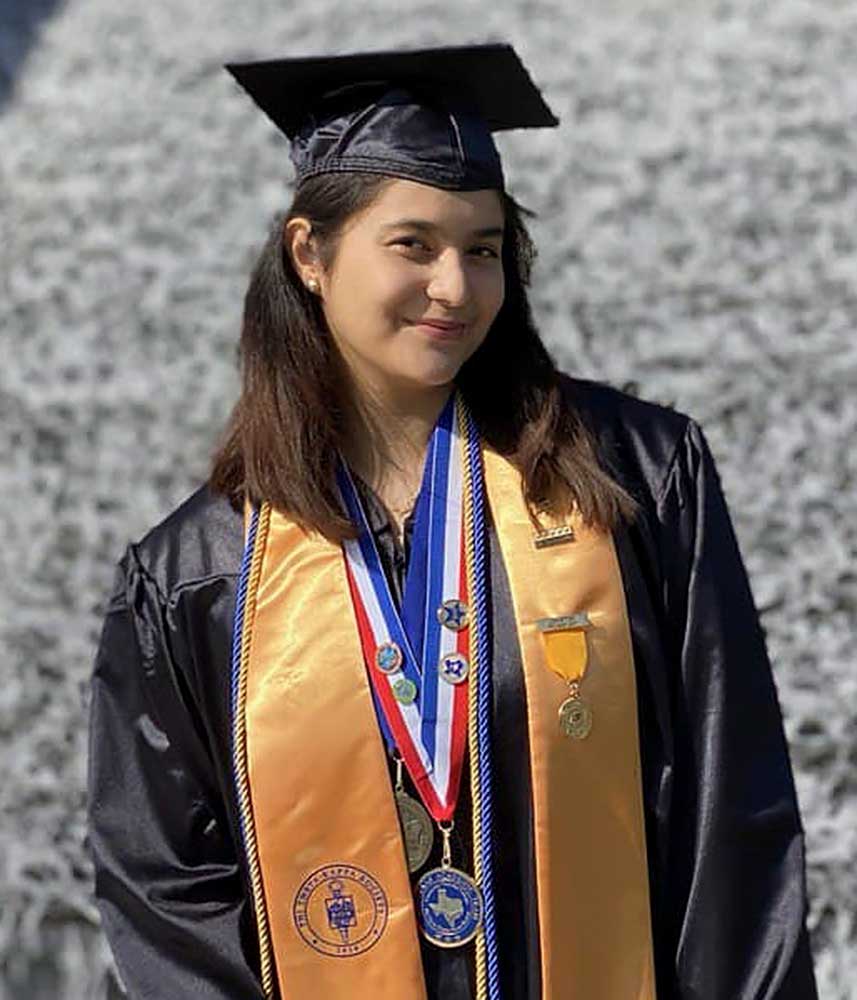International Students
 Play Video
Play Video
Get to Know Houston
International Student Support Resources
Find out how you can maintain your F-1 student visa status and study in the US.
Must-Have Documents
Passport
Your passport must be valid for at least six months from your date of enrollment. Check the expiration date and have it renewed if needed. You can do this in the U.S. through an official consulate from your home country. If you renew through the mail, be sure to request certified delivery with a return receipt.
F-1 Visa
I-94 Card
When you enter the United States, U.S. Customs and Border Protection has automated Form I-94 at the port of entry. A traveler lawfully admitted (or paroled) into the U.S. may print their lawful record of admission (I-94 form) from the CBP website.
Form I-20
Frequently Asked Questions
At San Jacinto College, students on an F-1 student visa are international students.
An F-1 student is a nonimmigrant who is pursuing a full course of study to achieve a specific educational or professional objective, at an academic institution in the United States that has been designated by the Department of Homeland Security (DHS) to offer courses of study to students and has been enrolled in SEVIS (the Student and Exchange Visitor Information System).
International students cannot enroll in the following programs:
- Maritime Transportation
- Health Information Technology *
- Culinary Arts *
- Accounting (A.A.S program only) *
- Business Office Systems & Support *
- Computer Information Technology- Cloud Computing, Cybersecurity *
*International students are prohibited from enrolling in programs that are mainly offered online*
No, San Jac does not require that you purchase an insurance policy; however, with the cost of medical treatment in the U.S., we highly recommend that you cover yourself by purchasing insurance. Your designated school official can provide information on health insurance providers. We strongly encourage students to have insurance.
Yes. F-1 students are required to take and complete a minimum of 12 semester credits every fall and spring semester as required by United States Citizenship and Immigration Services (USCIS) rules and regulations.
If you are an initial student (new to the country) in the summer, you are required to enroll in 12 credit hours in the summer term.
Students with F-1 visas who take less than a full course load may become out of status and risk penalties by USCIS, up to and including deportation.
F-1 students may enroll in online classes. Please note: If you are enrolled in 12 credit hours, 9 hours must be face-to-face, and only 3 hours may be taken online or hybrid.
Yes, all first time in college students must attend new student orientation before registering for classes.
Transfer students with less than 11 credit hours are also required to attend orientation. Once you have an advising session with the international staff, you will receive further guidance.
All new F-1 visa students, are also required to attend international student orientation which is held two weeks after the semester begins. Students will meet new students, learn more about F-1 visa regulations, learn about campus resources and receive their I-20.
DSO stands for designated school official. A DSO is responsible for reporting and updating information to the U.S. Citizenship and Immigration Service (USCIS) about the F-1 student's situation.
International students are charged out of state and other non-resident tuition and fees. You may review tuition & fees for more information.
Federal financial aid is not offered to international students. International students must have sufficient funds to cover all expenses incurred while at San Jacinto College: tuition, fees, books, housing, transportation, living expenses, travel and all costs.
However, international students with an F-1 visa are eligible for the Texas Public Grant (TPEG) Application for Foreign Students often referred to as Foreign TASFA. Foreign TASFA is state financial aid. For more information visit International Student Services or the Financial Aid Office.
Yes. Accessibility Services at San Jacinto College provides services to students with disabilities, ranging from providing note takers to sign language interpreters, and quiet testing rooms to extended test times. Services are provided free of charge to students, but documentation of the disability is required.
Visit Accessibility Services or call 281-922-3444 for more information.
San Jacinto College considers all applicants without regard to race, creed, color, sex, age, national origin or disability.
No. San Jacinto College does not provide housing to students. However, apartment buildings are located within walking distance of the college. In addition, many private parties advertise rooms for rent on bulletin boards around campus.
Yes. Even though you may have a valid F-1 visa and I-20 from another school, you will still need an I-20 from San Jacinto College.
Important:
In order for you to receive an I-20 from our college, you must complete the international admissions transfer process and receive an acceptance letter from our college.
The Student and Exchange Visitor Program (SEVP) is designed to help the Department of Homeland Security (DHS) and Department of State better monitor school and exchange programs and F, M and J category visitors.
Exchange visitor and student information is maintained in the Student and Exchange Visitor Information System (SEVIS). SEVIS is an Internet-based system that maintains accurate and current information on nonimmigrant students (F and M visa), exchange visitors (J visa), and their dependents (F-2, M-2, and J-2).
SEVIS enables schools and program sponsors to transmit mandatory information and event notifications via the Internet, to the DHS and Department of State (DOS) throughout a student or exchange visitor's stay in the United States.
A citizen of a foreign country who seeks to enter the United States (U.S.) generally must first obtain a U.S. visa, which is placed in the traveler’s passport, a travel document issued by the traveler’s country of citizenship.
Certain international travelers may be eligible to travel to the U.S. without a visa if they meet the requirements for visa-free travel. The visa section of this website is all about U.S. visas for foreign citizens to travel to the U.S.
(Note: U.S. citizens don’t need a U.S. visa for travel, but when planning travel abroad may need a visa issued by the embassy of the country they wish to visit. When planning travel abroad in this situation and to learn about visa requirements by country, see Country Specific Travel Information in the International Travel section of this website.)
How Can I use a Visa to Enter the U.S.?
Having a U.S. visa allows you to travel to a port of entry, airport or land border crossing, and request permission of the Department of Homeland Security (DHS), Customs and Border Protection (CBP) inspector to enter the U.S. While having a visa does not guarantee entry to the U.S., it does indicate a consular officer at a U.S. embassy or consulate abroad has determined you are eligible to seek entry for that specific purpose. DHS/CBP inspectors are responsible for admission of travelers to the U.S., for a specified status and period of time. DHS also has responsibility for immigration matters while you are present in the U.S.
What Types of Visas Are There?
The type of visa you must obtain is defined by U.S. immigration law, and relates to the purpose of your travel. There are two main categories of U.S. visas:
- Nonimmigrant visas – For travel to the U.S. on a temporary basis. Learn more.
- Immigrant visas – For travel to live permanently in the U.S. Learn more.
For more information, visit U.S. Visas, U.S. Department of State, Bureau of Consular Affairs.
Student Acceptance at a SEVP Approved School
Before you can apply at a U.S. Embassy or Consulate for an F or M student visa, you must first apply to and be accepted by an SEVP approved school. Visit the Department of State website, EducationUSA, to learn about educational opportunities for undergraduate and graduate study, opportunities for scholars, admissions, and more. You can also visit the DHS Study in the States school search page to search for SEVP-certified schools.
When you are accepted by the U.S. school you plan to attend, you will be enrolled in the Student and Exchange Visitor Information System (SEVIS). You must pay the SEVIS I-901 Fee. The U.S. school will provide you with a Form I-20 to present to the consular officer when you attend your visa interview. If your spouse and/or children intend to reside with you in the United States while you study, they must obtain individual Form I-20s, but they do not pay the SEVIS fee. Visit the U.S. Immigration and Customs Enforcement (ICE) Student and Exchange Visitor Program (SEVP) website to learn more about SEVIS and the SEVIS I-901 Fee.
How to Apply
There are several steps to apply for a visa. The order of these steps and how you complete them may vary at the U.S. Embassy or Consulate where you apply. Please consult the instructions available on the embassy or consulate website where you intend to apply.
Complete the Online Visa Application
- Online Nonimmigrant Visa Application, Form DS-160 – Learn more about completing the DS-160. You must: 1) complete the online visa application and 2) print the application form confirmation page to bring to your interview.
- Photo –You will upload your photo while completing the online Form DS-160. Your photo must be in the format explained in the Photograph Requirements.
When you enter the United States on a student visa, you will usually be admitted for the duration of your student status. That means you may stay as long as you are a full time student with a valid I-20, even if the F-1 visa in your passport expires while you are in the U.S.
Your passport must be valid at all times in order to remain in the U.S.
Yes, as long as you have not violated your student status, you may legally remain in the United States with an expired F-1 visa. However, if you exit the U.S., you must have a valid visa for re-entry.
No. For more information about visa applications visit the Department of State website at http://travel.state.gov/.
On-Campus Employment
F-1 students may work at any on-campus job that does not displace a U.S. citizen or
lawful permanent resident (LPR). They can work up to 19.5 hours per week while school
is in session. They may work full-time during those periods when school is not in
session or during the student’s annual break if supervisor approved. Not complying
with these guidelines for on-campus employment may be a violation of status that could
result in the student having to leave the United States.
Off-Campus Employment
F-1 students are allowed to enter the United States for academic studies. They are
required to show that they will be able to afford the costs of school and living expenses
prior to entry and should not plan on being allowed to work off-campus. Off-campus
employment is not permitted. Off-campus employment is only authorized in cases of
severe economic hardship occurring subsequent to a student’s enrollment in an academic
program or in emergent circumstances as defined by DHS.
Yes. U.S. Social Security numbers are approved for people who are authorized to work in the United States. These numbers are used to report your wages to the U.S. government and to determine eligibility for Social Security benefits. If you are temporarily in the United States to attend college, with a non-immigrant F-1 student classification without an on-campus work authorization, you cannot apply for U.S. Social Security. The Social Security Administration will not assign you a number just to enroll in college or school. Please talk to International Services before applying for social security.
You may need to leave the United States to re-establish student status by re-entering the country with a new I-20 or by filing a reinstatement request with the Department of Homeland Security. For more information, please visit International Student Services immediately.
We recommend that you be in Houston 30 days prior to starting school, so you can get settled in before classes begin. However, you may not enter the United States more than 30 days before your program start date listed on the I-20 form if you are a new student. You must report your entry into the United States at the San Jacinto College South Campus, International Student Services.
You will need to meet with International Student Services to review extension information and to determine how much time is needed to complete your program. Your DSO will advise you. You may be eligible for a one-time extension to your program's end date if requested by the student BEFORE the end date on your I-20 form. If you fail to extend the date, you may lose your F1 status.
As an F-1 student, you must always be aware of your program end date and make sure it does not expire regardless of the institution you are attending. You may visit International Student Services for further guidance.
F-1 students may travel outside of the U.S. while the semester is not in session. You will need to obtain a travel signature on your original I-20 before departing the U.S. We encourage you to visit International Student Services to obtain a travel signature no later than three (3) weeks before traveling. If traveling in between semesters, you must register for classes for the following semester before obtaining a travel signature.
Sadokat Khakimova



